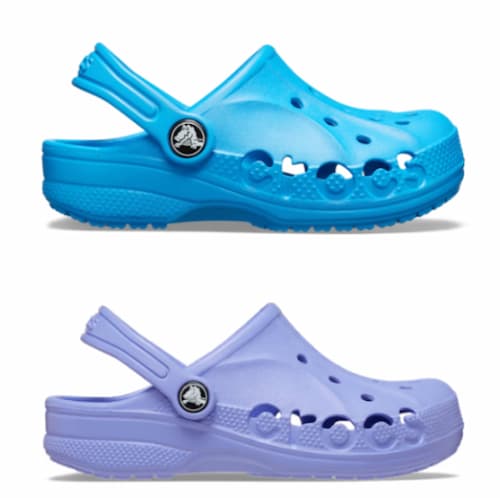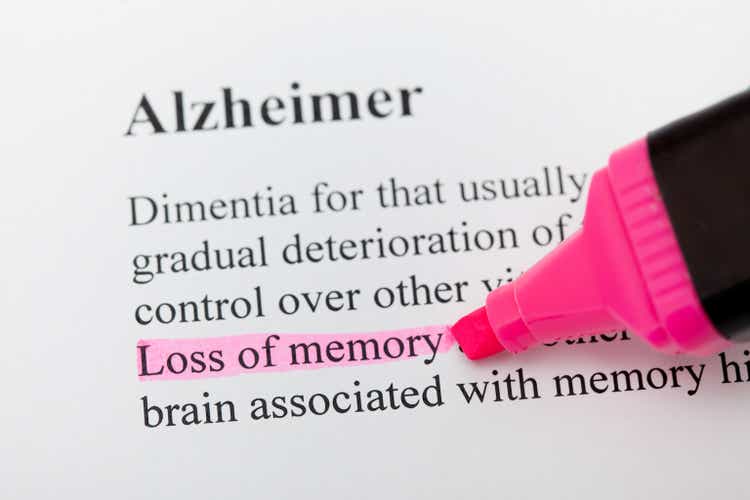filadendron/E+ via Getty Images
Driven by novel therapeutics from Biogen (NASDAQ:BIIB)/ Eisai (OTCPK:ESALF) and Eli Lilly (NYSE:LLY), the Alzheimer’s disease market across eight major countries will reach $13.7B in 2030, the data analytics firm, GlobalData said last week.
That implies a compound annual growth rate of 20% from 2020 when the AD market size was $2.2B, the research firm projected considering the U.S., U.K., France, Germany, Italy, Spain, Japan, and China in its forecast.
The introduction of 23 new pipeline products, including disease-modifying therapies (DMTs), is expected to be behind this momentum, GlobalData said in its report titled “Alzheimer’s Disease: Eight-Market Drug Forecast and Market Analysis – Update.”
Before 2021, the AD market was dominated by acetylcholinesterase inhibitors designed to relieve Alzheimer’s symptoms. “These drugs are modestly effective and primarily off patent, thus creating significant opportunity for new entrants into the AD market,” remarked Philippa Salter, Neurology Analyst at GlobalData.
Recently, drug developers have seen success with amyloid targeting Alzheimer’s agents. The FDA approved the first DMT Aduhelm (aducanumab), an anti-amyloid monoclonal antibody (mAb) from Biogen (BIIB)/ Eisai (OTCPK:ESAIY), in 2021, albeit under controversial circumstances.
This week, an advisory panel of the agency overwhelmingly endorsed the full approval for the duo’s new anti-amyloid agent Leqembi (lecanemab) following accelerated approval early this year. A shift to its full approval expected within weeks could pave the for its Medicare coverage under certain restrictions.
The market rollout of Aduhelm, Leqembi, and Eli Lilly’s (LLY) upcoming anti-amyloid mAbs donanemab and remternetug will likely be a significant factor behind the AD market growth.
However, sales for Aduhelm are expected to be low. “The drug’s launch was marred by controversy surrounding the FDA’s decision, which conflicted with its advisory board’s opinion that there was not enough evidence to support whether Aduhelm could effectively slow cognitive decline,” Salter noted.
In contrast, Leqembi and donanemab, for which Lilly (LLY) intends to file a marketing application for regular approval this quarter, are set to become top-selling AD drugs by 2030, generating $3.5B and $2.0B in sales, respectively.
“Leqembi and donanemab have both demonstrated that they can reduce cognitive decline in Phase III clinical trials,” Salter explained.
However, there will be challenges to treatment uptake, including low diagnosis rates across the disease spectrum. As a result, there will be an unmet need for accurate, convenient diagnostic tests and biomarkers used for patient classification and the evaluation of therapeutic response.
“As trial designs and the incorporation of biomarkers in trials improve, and testing in the pre-symptomatic AD population becomes accessible, opportunity will increase for players looking to enter the AD market in the future,” Salter concluded.
Other Alzheimer’s drug developers: Cassava Sciences (SAVA), Anavex Life Sciences (AVXL), Annovis Bio (ANVS), Alnylam Pharma (ALNY), Prothena (PRTA), Alector (ALEC), AC Immune (ACIU), INmune Bio (INMB), Athira Pharma (ATHA), BioVie (BIVI) and Roche (OTCQX:RHHBY) (OTCQX:RHHBF) (OTCPK:RHHVF), Acumen Pharma (ABOS)








































